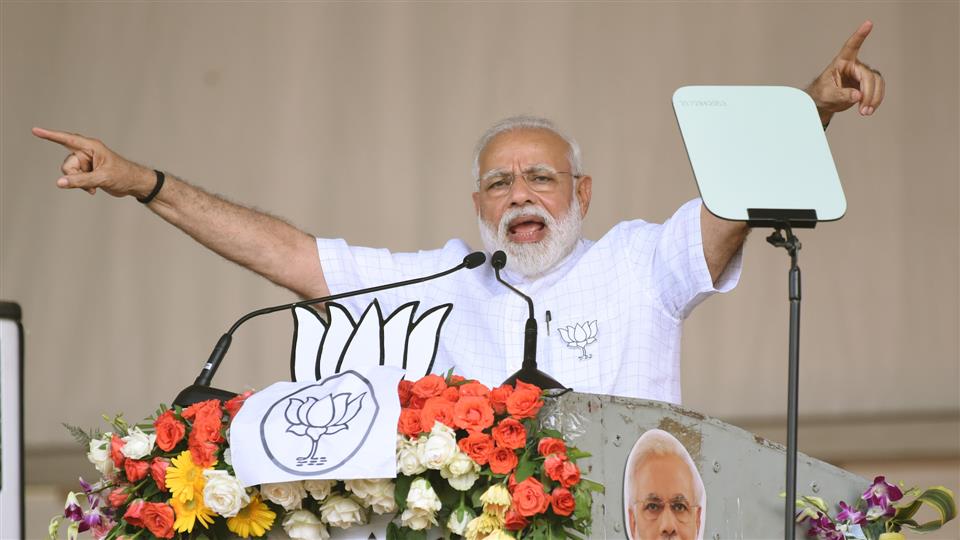Narendra Modi has been re-elected as prime minister of India in a landslide, with the BJP winning sweeping victories across the states. Perhaps the Hindu gods smiled upon him, rewarding his party’s fierce Hindu nationalism. He should also pleased that the Buddha, or at least the Buddhist acolytes and spokespeople Modi appealed to for the past several years, answered his call. Several Indian Buddhists I spoke to, particularly in states like West Bengal, who proudly proclaimed that he, or his BJP representative, would get their vote.
After years of speculation in Indian papers and Anglophone websites about the effectiveness of his wooing Buddhists, I think we can draw some conclusions. Based on the results alone, regardless of whether one agrees with his beliefs or principles, I think Modi has done immensely well for his party and, more significantly, added legitimacy to his vision of how India should be governed. Furthermore, the way in which he deals with its religious traditions, including Buddhism, has been re-affirmed by many spiritual adherents and leaders themselves.
Some weeks ago we published a news report about Modi’s all-out efforts to win over the diverse Buddhist lobbies as he faced a faltering campaign. To be sure, not every single tactic he deployed was successful. There was intense scrutiny about his busing of monastic allies across Uttar Pradesh to campaign for him in 2016. He seemed particularly attached to commissioning and inaugurating large monuments to Buddhist figures, with the Dalit constitutionalist and Buddhist convert B. R. Ambedkar serving as a rallying point he returned to repeatedly.
Furthermore, his approach to India’s relationship with the Dalai Lama was generally agreed by diplomatic correspondents and foreign policy analysts to have been overconfident and criticized by not just China but, according to some sources, by circles moving close to the Dalai Lama himself. The Sino-Indian standoff at the Bhutanese border of Doklam in June 2017 remains a sore reminder for Modi of how things can spiral out of control when one overplays what Indian generals and diplomats see as a religious form of geopolitical leverage against China.
In his critics’ eyes, it was not the policies but the literal statements that Modi made, his gestures and signalling to his desired demographics, that shaped his statesmanship. His robust action against Pakistan after 40 Indian security personnel were killed by a Pakistan-based militant group on 14 February and his visits to sacred sites of diverse traditions all share a common theme: displaying to the world, like a wise yet no-nonsense silverback, an image of a spiritual yet muscular defender of India’s interests, prestige, and values in a world of hostile competitors and limp-wristed naysayers at home. Just look at the title he proudly crowned himself with: “watchman,” or chowdikar.
While it is never helpful to be too attached to East-West comparisons, I cannot help but draw parallels. That a right wing populist would surprise and defeat a centre left challenger or established option is becoming a replicable electoral story. Trump. Brexit. Anti-EU victories across not just Southern and Eastern Europe, but in even the prosperous heartlands of Northern Europe. A surprise victory by Scott Morrison’s reigning LNP over Labor just last week in Australia.
A common thread, among many which I will not list today, is a return to traditional values and faith. Trump has successfully courted conservative Christian evangelicals, whose long-term endgame of overturning abortion at the Supreme Court level is now kicking into high gear, and Morrison is a Pentecostal churchgoer who has also brought Australia’s conservative Christian voting bloc into his orbit. Modi is perhaps even more experienced and shrewd in his courting of religious forces, since India’s diversity of faiths, castes, and interest groups boggle even the most seasoned India watcher and even policymakers within India.
What next for Buddhism? More resources may be funnelled into domestic Buddhist diplomacy and Dalit campaigning, while in my experience, two core ministries, those of culture and tourism (notably not the Ministry of External Affairs), will likely continue working with with diplomatic missions to continue the work of shoring up India’s position as a Buddhist custodian for not just South Asia, but for Asia as a whole.
We do not know what Indian consulates and embassies around the world have planned for foreign Buddhist leaders and watchers. However, if the past few years are anything to go by, Modi’s approach has been vindicated, with a few major wrinkles that will perhaps be ironed out as the BJP refines what I call its “monist” or “Sankarist” strategy towards religion. In Modi’s war room, the core game plan is that all faiths will be courted and respected, but in a domestic context, non-Hindu faiths should, at the very least, keep one eye shut when they are proclaimed as part of India’s “Hindu nation.”


[…] May’s Indian elections, PM Narendra Modi’s BJP fared considerably well, indirectly securing a mandate for its Buddhist diplomacy. This “quiet” diplomacy began several years ago in September 2015, with the Vivekananda […]